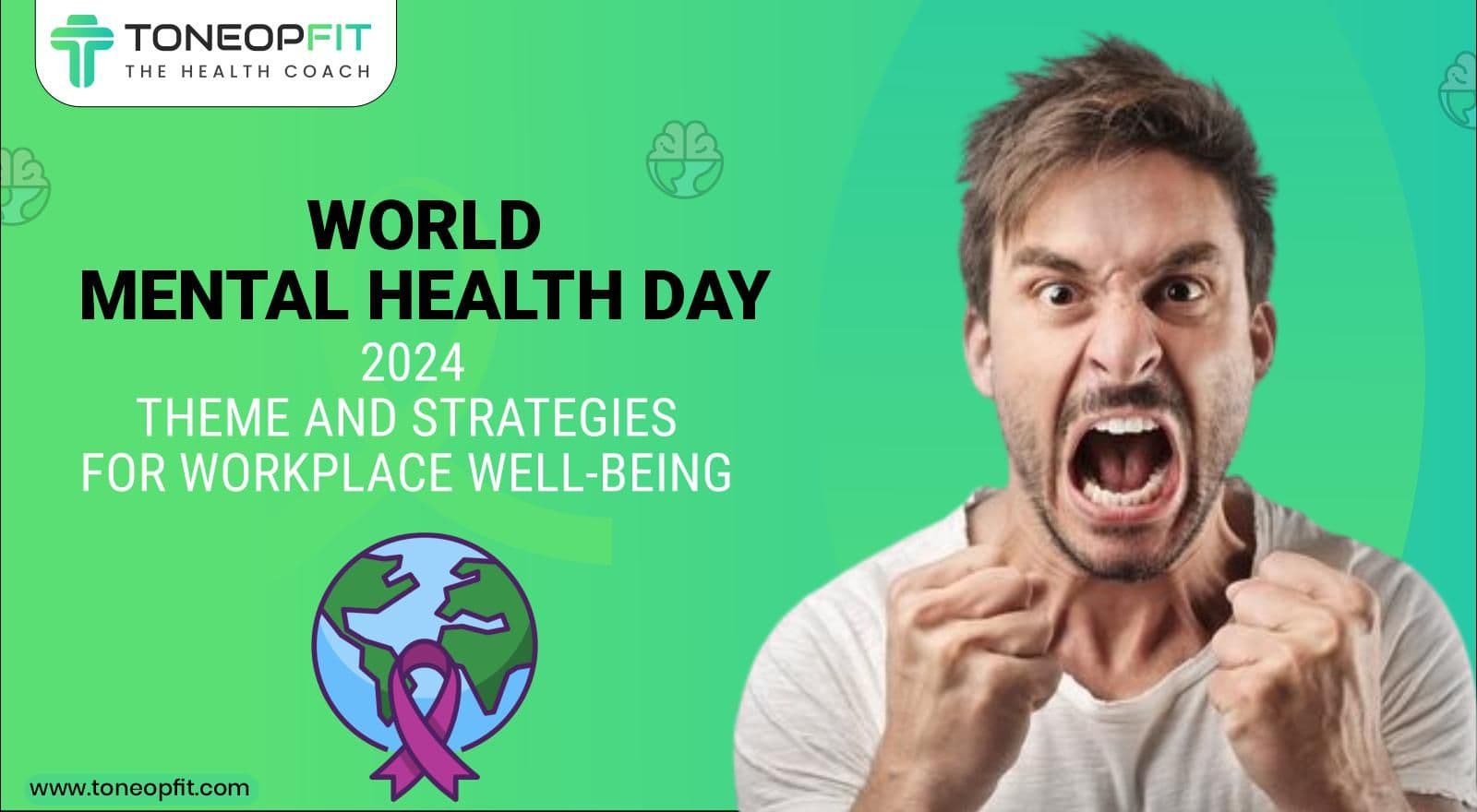It is Time to Prioritize Mental Health in the Workplace
The mind is a delicate thread, weaving through every part of our lives—our thoughts, our relationships, and especially our work. When the thread is strong, it connects us with purpose and clarity. But when frayed by stress, anxiety, or burnout, everything begins to bruise, impacting not just us but everyone around us. This is the silent struggle millions face every day.
On World Mental Health Day 2024, we’re reminded how important it is to protect and prioritise your mental well-being, especially at work, where you spend most of your day. Poor mental health at work? It's like a domino effect—lower job satisfaction, reduced performance, burnout, and even serious health risks. And guess what? The stress doesn’t just stay in the office; it comes home with you, impacting your family and community. The numbers speak for themselves: the WHO estimates that 12 billion working days are lost each year to depression and anxiety, costing economies billions. Crazy, right?
In countries like India, where informal jobs dominate the workforce and job security is shaky, addressing workplace mental health becomes even more vital. This year’s theme urges us to recognise the importance of creating environments where well-being is a priority, not an afterthought. As we reflect on this vital topic, let us remember the words of renowned author Maya Angelou: “I can be changed by what happens to me. But I refuse to be reduced by it.”
You are capable of great things, even when you're struggling. In this article, we will talk about the important of this day, why mental health matters at work and how we can take steps to ensure a healthier workplace ecosytem for everyone in the nation.
Key Highlights Regarding Workplace Mental Health In India
- Toxic work environments and career-related decisions are significant stressors, with 31% of respondents identifying workplace pressure as a major mental health concern.
- GenZ experiences 18% more career anxiety compared to Millennials.
- Approximately 16% of employees in top workplaces report high burnout levels, with this figure rising to 40% in less supportive environments.
- A study by Manah Wellness revealed that among 1,764 employees in urban India, nearly 29% exhibited moderate-to-severe signs of depression, 55% showed moderate-to-severe signs of anxiety, and 78% reported moderate-to-high stress levels.
- Many employees face stigma regarding mental health issues, with studies indicating that up to 67% have experienced discrimination related to their mental health conditions
Table Of Contents
- About World Mental Health Day: It Matters For Everyone
- What Is The Slogan/Theme For World Mental Health Day?
- What Color Represents World Mental Health Day?
- World Mental Health Day Awareness: A Universal Need
- 10 Ways to Safeguard Employees' Mental Health at the Workplace
- Expert’s Advice
- The Final Say
- FAQs
- References
About World Mental Health Day: It Matters For Everyone
Your mental health is your superpower.
Every year on October 10th, the world observes World Mental Health Day, a global endeavour to promote mental health awareness and mobilise actions to support mental health globally. The World Federation for Mental Health (WFMH) established the day in 1992 as a wayto increase understanding of mental health concerns that affect people, families, communities, and society as a whole.
Also Read: World Heart Day 2024: Theme, Motto And Engaging Activities To Promote Heart Health
What Is The Slogan/Theme For World Mental Health Day?
The message for World Mental Health Day 2024 is clear: "It is Time to Prioritise Mental Health in the Workplace."
We spend so much of our lives at work, so it only makes sense that where we work should care about our mental well-being, too, right? This year’s slogan is urging everyone—whether you're an employer, a manager, or an employee—to work together and build a workplace that takes work stress and mental health seriously. No more brushing it under the carpet or pretending it’s not an issue. It's time to step up.
Let’s be real. When companies neglect mental health, it doesn’t just hurt individuals—it impacts everyone. Stress, burnout, and feeling overwhelmed are real threats to productivity and the overall happiness of the workforce. But imagine how much more involved, creative, and satisfied people could be if mental health support was baked into work culture. It’s good not just for the individual but for the business, too. By making mental health a priority, businesses can cultivate a workforce that’s happier, healthier, and more efficient. Everyone wins.
And there’s more to this than just productivity. This slogan is about killing the stigma. We’ve all felt that hesitance about talking to someone at work when things get tough. This year’s message encourages workplaces to make sure everyone feels comfortable seeking help without fear of judgment. Mental health isn’t just a personal issue—it’s a collective responsibility that involves everyone in the workplace.
A lot of people are struggling, especially in India. A review of multiple studies found that 10% to 52.9% of workers are dealing with depression. That’s right, nearly half of some workforces. And anxiety? Anywhere from 7% to 57%. Workplace stress is also rampant, with rates ranging from 3.8% to 75.5%. Those are some big numbers. It’s time to acknowledge that mental health struggles at work are real—and widespread.
Also Read: 11 Effective Strategies For Managing Stress At Work To Boost Productivity And Well-Being
What Color Represents World Mental Health Day?
What colour represents all this mental health awareness? Green. Why? Because green is about hope, strength, and support. It’s about healing and renewal—exactly what’s needed when addressing mental health. Wearing a green ribbon on World Mental Health Day is more than just a fashion statement—it’s a symbol of solidarity. It says, "We’re in this together." By donning green, we help break the silence, spark conversations, and raise awareness about mental health in a way that’s powerful and visual.
The green ribbon has become an emblem of mental health advocacy. It’s a small but mighty way to show support for someone who is dealing with mental health concerns, reminding the world that mental well-being matters—and we all need access to care and compassion.
Also Read: 5 Stress Relief Workouts And 7 Ways To Unwind For A Balanced Life
World Mental Health Day Awareness: A Universal Need
On World Mental Health Day, awareness campaigns take centre stage, shining a light on the warning signs of anxiety, depression, and burnout. These campaigns don’t just educate—they inspire action, urging people to seek help before it's too late.
Through social media, public events, workshops, and wearing the green ribbon symbol, people worldwide participate in spreading knowledge and encouraging discussions about mental health.
Also Read: Doctors Day 2024: How Do Doctors Maintain Their Health? 10 Tips For A Healthy Lifestyle
10 Ways to Safeguard Employees' Mental Health at the Workplace

Sleep is nature's reset button. Press it every night to wake up refreshed, focused, and ready to take on the day.
Your workplace should be a sanctuary for your mind, not a battleground for your sanity.
Safeguarding employee mental health at the workplace has become a priority for companies worldwide, especially following recent events like the tragic death of 24-year-old EY employee Anna Sebastian, who reportedly died by suicide due to work-related or occupational stress. This heartbreaking incident has shone a spotlight on the importance of mental health, particularly in high-stress environments like multinational corporations.
Here are 10 practical ways to safeguard employees' mental health at work, along with real-life examples from these corporations:
1. Promote Awareness and Reduce Negative Emotions
Understanding your mental health at work is the first step in taking care of it. In India, there's still a lot of stigma surrounding mental health, making it tough for people to talk about their struggles. But if companies run awareness campaigns, host seminars, and organise workshops, it helps. It’s about starting conversations, educating people, and normalising mental health talks. When you learn more about mental health, it becomes easier to seek help when you need it.
Take Deloitte, for example. They run a campaign called "This is Me", where employees share personal mental health stories. It’s their way of creating a supportive and open environment, along with offering regular stress-management workshops.
2. Create a Mental Health Task Force
Having a dedicated group focused on mental health can make all the difference. Companies should form a task force with HR, mental health experts, and employees. Their job? To create policies, programs, and safe spaces where people can share openly about their mental health struggles.
EY has set the bar with its Employee Assistance Program (EAP). It provides confidential counselling, workshops, and stress management resources, helping employees navigate tough times.
3. Flexible Work Hours and Remote Work Options
Flexibility at work can greatly reduce stress. Offering flexible hours or remote work options lets you balance your personal and professional life. Commuting every day? That’s stressful. TCS understands this and, post-pandemic, launched the 25x25 model, letting 25% of its employees work from home 25% of the time. A flexible routine can ease work-life pressures and help you breathe easier.
4. Access to Professional Mental Health Resources
Support for mental health should be easily accessible to all. This could entail partnerships with mental health professionals or the usage of in-house counsellors. You can learn how to control your stress and anxiety by using services like mindfulness training or cognitive behavioural therapy (CBT).
KPMG India partners with 1to1Help, an employee well-being platform offering professional counselling, life coaching, and tons of self-help tools.
5. Encourage Work-Life Balance
We’ve all heard it before—balance is key. Long hours and unrealistic demands can hurt mental health. To prevent burnout, companies need to promote a healthier work-life balance at work and beyond by setting fair expectations and encouraging regular breaks.
It’s not just a feel-good idea—research shows that long-term stress is harmful. Burnout leads to lower productivity, so striking a balance benefits everyone.
6. Mental Health Leave
Physical health days are a given, but mental health days should be, too. Companies should offer mental health leave so you can take time to recharge when needed without feeling judged.
Deloitte India leads by example, offering "Well-being Days" specifically for mental health breaks. Employees can take time off without having to explain themselves, knowing that their mental health is just as important as their physical health.
7. Anonymous Reporting and Feedback Systems
Sometimes, the safest way to talk about your mental health concerns is anonymously. Companies should create systems that let employees report stress, burnout, or bullying without revealing their identity.
EY introduced an anonymous portal where employees can voice their worries. This gives the HR team a chance to fix problems early and protect mental health proactively.
8. Train Managers and Leaders
Leaders play a huge role in shaping workplace culture. Managers should receive training on how to identify mental health struggles, like sudden changes in performance or behaviour. If they notice something, they need to approach it with empathy and confidentiality.
A manager who encourages open communication and creates a safe space can be the difference between an employee staying silent or seeking help.
9. Ergonomic and Wellness-Focused Workspaces
Your workspace should work for you, not against you. Ergonomic seating, access to natural light, and quiet spaces for relaxation can create a healthier environment. Plus, offering yoga (where you can do some calming office yoga poses to boost productivity), meditation, or mindfulness sessions at work can help manage stress.
TCS has wellness hubs in their offices where employees can unwind with yoga, meditation, and quiet reflection areas. These little breaks can make a big difference.
10. Incorporating Mental Health into Company Policies
Finally, companies need to bake mental health into their policies. This means setting fair workloads, limiting overtime, promoting work-life balance, and taking steps to prevent burnout.
Also Read: Weekend Exercises: Boost Your Fitness Levels With These 8 Fun Workouts
Expert’s Advice
On this World Mental Health Day, let us commit to breaking the silence, challenging stigma, and working together to build a future where mental health is a priority for all. We can establish a society where mental and physical health are valued equally by promoting an environment of transparency and empathy.
Health Expert
Akshata Gandevikar
The Final Say
Mental health is a journey, not a destination. There will be ups and downs, but the important thing is to keep moving forward.
On World Mental Health Day, we are reminded that mental health is a global concern that impacts individuals of all ages, ethnicities, and cultures. Even though mental health awareness has increased significantly, there is still much work to be done to break the stigma, improve access to care, and promote mental well-being.
FAQs
1. Why is October 10 Mental Health Day?
World Mental Health Day is observed on October 10 to promote mental health and increase awareness of mental health concerns worldwide. The day aims to reduce stigma and encourage support for mental health initiatives.
2. Who introduced Mental Health Day?
In 1992, World Mental Health Day was first observed by the World Federation for Mental Health and was initiated by Richard Hunter, its Deputy Secretary General. The day has since evolved to include specific themes each year to focus on various mental health issues.
3. What are some common mental health conditions?
Frequent mental health issues encompass depression, anxiety, bipolar disorder, schizophrenia, and post-traumatic stress disorder (PTSD). These factors influence individuals' cognitive processes, feelings, and actions and have a notable effect on day-to-day activities.
4. Why is World Mental Health Day important?
This day plays a critical role in breaking the stigma surrounding mental health, raising global awareness, and prompting action to improve mental health care access. It serves as a platform for advocating for better mental health policies and encouraging open talk.
References
- https://wmhdofficial.com/about-2024/
- https://economictimes.indiatimes.com/news/new-updates/world-mental-health-day-2024-history-significance-theme-and-some-stress-management-tips/articleshow/114063077.cms?from=mdr
- https://idronline.org/article/philanthropy-csr/philanthropy-must-focus-on-indias-mental-health-crisis/?gad_source=1&gclid=Cj0KCQjwsJO4BhDoARIsADDv4vDaLFgquuY5cgc21d_mzrwcoo0seisH5Ao8Eu3V_SnFKNwKOAdd6asaAg6IEALw_wcB
- https://journals.lww.com/indianjpsychiatry/fulltext/2024/66002/mental_health_and_well_being_at_the_workplace.16.aspx#:~:text=A%20review%20of%20various%20studies,of%20workers%20suffered%20from%20workplace
About ToneOp Fit
ToneOp Fit is a platform dedicated to improving and maintaining good health through a comprehensive range of goal-oriented health plans with up to 3 Coach support. With a range of Weight Management, Medical Condition, Detox Plans, and Face Yoga Plans, the app also provides premium health trackers, recipes and health content. Get customised diet, fitness, naturopathy & yoga plans and transform yourself with ToneOp.








































